Montreal was founded 375 years ago
To spread the Faith in America
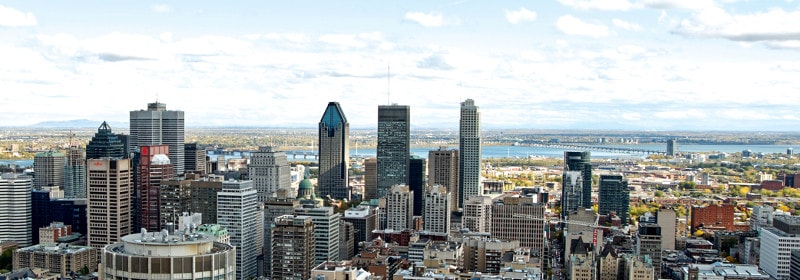
 2017 marks the 375th Anniversary of the City of Montreal, which was founded on May 17, 1642 under the name of Ville-Marie (literally, Mary’s town). What is noteworthy in Ville-Marie’s foundation are the missionary intentions of its founders. Montreal was not established in a mercantile spirit or one of conquest, but for the purpose of spreading the Catholic Faith in America. The founders of Montreal were saints. We have every reason to be proud of them and to continue to live the legacy of the Catholic Faith they handed down to us. A look back on history will help us to better understand.
2017 marks the 375th Anniversary of the City of Montreal, which was founded on May 17, 1642 under the name of Ville-Marie (literally, Mary’s town). What is noteworthy in Ville-Marie’s foundation are the missionary intentions of its founders. Montreal was not established in a mercantile spirit or one of conquest, but for the purpose of spreading the Catholic Faith in America. The founders of Montreal were saints. We have every reason to be proud of them and to continue to live the legacy of the Catholic Faith they handed down to us. A look back on history will help us to better understand.
A fortified village, called Hochelaga, already existed on the island when Jacques Cartier arrived from France on October 2, 1535. He was welcomed by the Iroquois, and he named the mountain he saw, in the middle of the island, Mount Royal (hence the name of Montreal). Later, when Samuel de Champlain traveled in the region, in 1603, he found no traces of the village of Hochelaga. In 1611, the founder of Quebec City, realizing the strategic location the island occupied, commanded that a stretch of land be cleared at Pointe-à-Callière.
Jerome Le Royer de la Dauversiere
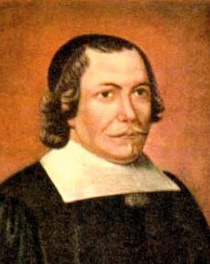 It was Jerome Le Royer de la Dauversiere who was the initiator of the project to found Ville-Marie on the island of Montreal. In France where he lived, this layman, the father of five, claims to have received a calling, while in prayer, to found a mission colony on the island of Montreal. Without having ever seen the site, he could describe its geography with precision; its river, its mountain. After many years of inner turmoil, he decided in 1635 to put the project in effect and headed for Paris to look for associates.
It was Jerome Le Royer de la Dauversiere who was the initiator of the project to found Ville-Marie on the island of Montreal. In France where he lived, this layman, the father of five, claims to have received a calling, while in prayer, to found a mission colony on the island of Montreal. Without having ever seen the site, he could describe its geography with precision; its river, its mountain. After many years of inner turmoil, he decided in 1635 to put the project in effect and headed for Paris to look for associates.
According to a text found in the “Véritables motifs de la Société Notre-Dame de Montréal”, (True motives of Montreal’s Notre Dame Society) printed in 1643, the “purpose of Montreal had its origin in a man of virtue, Jerome Le Royer de la Dauversiere, that Providence deigned inspire, seven or eight years earlier, to work for the ‘savages’ of New France of whom he had little previous knowledge, and even though he felt this was beyond his capacity, contrary to his life’s condition and detrimental to his family. Finally, after having been repeatedly led and enlightened by interior visions that showed him the exact settings, the people and actions he had to serve... interiorly fortified in his undertaking, a service asked of him by God, he answered as had Samuel to his master.”
In 1640, Le Royer became an associate of Jean-Jacques Olier, who was later to found the Sulpicians in 1645, and together they established the “Société de Notre-Dame de Montréal” for the conversion of the inhabitants of the New World. According to Olier, the goal of this “crazy venture was to gather onto the island a people made up of French settlers and Indians who would cultivate the land and improve mechanical technology, and who would live as brothers and sisters, united in brotherly love.”
Mr. de la Dauversiere passed away on November 6, 1659, at the age of 72. He was declared venerable (the last step before beatification) by Pope Benedict XVI on July 6, 2007.
The history of Ville-Marie, later called Montreal, can be summarized by the answer of three young individuals to God’s calling, “Come. Follow me”: Paul de Maisonneuve, Jeanne Mance and Marguerite Bourgeoys. Though the city is now called Montreal, the diocese of Montreal still bears the official name of Marianopolis — Mary’s town in Latin.
Paul Chomedey de Maisonneuve
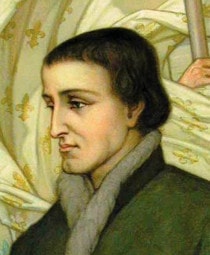 Paul de Maisonneuve was 29 when through his sister, a nun living in Troyes, he discovered the “Relations des Jésuites” (an account of the Jesuits’ activities in New France). He is overwhelmed by what he reads. He gets a calling: “Come, follow Me.” Shortly after, he meets one of the Jesuits, Fr. Charles Lalemant. He questions him at length, and asks him what he must do to take part in the great adventure of evangelization in New France.
Paul de Maisonneuve was 29 when through his sister, a nun living in Troyes, he discovered the “Relations des Jésuites” (an account of the Jesuits’ activities in New France). He is overwhelmed by what he reads. He gets a calling: “Come, follow Me.” Shortly after, he meets one of the Jesuits, Fr. Charles Lalemant. He questions him at length, and asks him what he must do to take part in the great adventure of evangelization in New France.
Father Lalemant arranged for him to meet Mr. de la Dauversiere who explained to him the purpose of the Société Notre-Dame de Montréal, to what de Maisonneuve replied: “Sir, I am ready to go to Montreal and to offer my life to God and give up what I most cherish in France.” There and then, Maisonneuve was made governor of Ville-Marie before he had even left France.
Jeanne Mance
 During which time, at Langres in Chapagne, a young woman in her thirties, Jeanne Mance, dreams of making of her life something worthwhile. She is endeared to God, but she does not think that she is cut out to be a nun. She awaits a sign from God… She hears about the missions in New France. She meets Father Lalemant… and she hears the calling in her heart: “Come. Follow Me.” Jeanne Mance keeps on repeating that she would not mind crossing the ocean, but wonders what God might want of her, so far away!
During which time, at Langres in Chapagne, a young woman in her thirties, Jeanne Mance, dreams of making of her life something worthwhile. She is endeared to God, but she does not think that she is cut out to be a nun. She awaits a sign from God… She hears about the missions in New France. She meets Father Lalemant… and she hears the calling in her heart: “Come. Follow Me.” Jeanne Mance keeps on repeating that she would not mind crossing the ocean, but wonders what God might want of her, so far away!
Jeanne is already a fervent apostle of New France, but she wishes to do more. She encounters a wealthy widow, Madam de Bullion, who wants to give her fortune for God, and offers Jeanne to establish, in the country she will go to, a Hotel Dieu, similar to the one found in Quebec City. Jeanne is in Larochelle ready to board ship, but with whom? She does not know until she meets Mr. de la Dauversiere standing in front of the Jesuits’ door. They do not know each other, but they recognize one another! Mr. de la Dauversiere, for many years, has been pursuing his dream to establish a colony and a hospital on the island of Montreal. Unable to leave France, he entrusts the foundation of his hospital to this young woman whom he has just met, but whom he knows was chosen by God to accomplish this task.
Jeanne Mance died in Montreal on June 18, 1673, at the age of 72. She was declared venerable by the Church on November 8, 2014. Her remains lie in the crypt of Montreal’s Hotel Dieu chapel.
Marguerite Bourgeoys
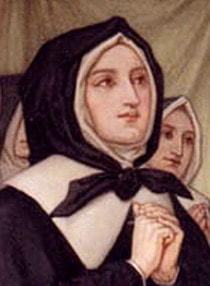 Ville-Marie/Montreal will have a third foundress. Once again, a young woman who has heard Jesus’ “Come. Follow Me,” through the news that arrives in France in the Relations des Jésuites. Ten years have gone by. Mr. De Maisonneuve, governor of Ville-Marie, returns to France in the fall of 1651 looking for help. The situation in Ville-Marie is desperate because of the attacks of the Iroquois. It will take him two years to find a hundred soldiers ready to defend Montreal. Before leaving France again, he pays a visit to his sister, a mother superior in Troyes. Once again, the holy craze takes hold of the sisters: they all want to leave for Ville-Marie, due to its desperate situation. Maisonneuve explains that for the time being what he needs are Christian women called to dedicate themselves to the world, not cloistered nuns.
Ville-Marie/Montreal will have a third foundress. Once again, a young woman who has heard Jesus’ “Come. Follow Me,” through the news that arrives in France in the Relations des Jésuites. Ten years have gone by. Mr. De Maisonneuve, governor of Ville-Marie, returns to France in the fall of 1651 looking for help. The situation in Ville-Marie is desperate because of the attacks of the Iroquois. It will take him two years to find a hundred soldiers ready to defend Montreal. Before leaving France again, he pays a visit to his sister, a mother superior in Troyes. Once again, the holy craze takes hold of the sisters: they all want to leave for Ville-Marie, due to its desperate situation. Maisonneuve explains that for the time being what he needs are Christian women called to dedicate themselves to the world, not cloistered nuns.
Sister Louise turns to a woman in her young thirties, Marguerite Bourgeoys. She is not a nun but she has encountered God earlier in her life. She was 20 in 1640 when she first heard the “Come. Follow Me.” She was following a procession in the streets of Troyes, when she saw, before a portal, a sculpture of the Virgin Mary:
“I saw how beautiful She was; and at the same time, I felt so touched and changed that I could not recognize myself…From that moment on, I left all my refinements, and I withdrew from the world to give myself to the service of God…For years, Marguerite sought what path to follow. In what religious order was she to live her vocation? Paul de Maisonneuve gives her the answer: To leave for Ville-Marie and teach the children. She so loved the natives that she succeeded in training the first two non-white nuns of America: an Algonquin, Mary-Theresa Gannesaquoa, and an Iroquoian, Mary-Barb Atontinon. When she passed away in 1700, there were already 40 nuns to pursue her work.
The beginning of a great adventure
On May 9, 1641, two ships left LaRochelle, taking with them to the high seas, on their way to New France, the greater part of Montreal settlers. De Maisonneuve was on one of the ships, along with 25 men and a secular priest destined to serve the Ursulines; in the other boat was Jeanne Mance, the nurse and storekeeper of the recruits, Father Jacques de La Place, a Jesuit, and 12 men. The remaining recruits (10 men) had left Dieppe some time before.
Once arrived in New France, the then governor, Huault de Montmagny, offers de Maisonneuve to settle on Isle d’Orléans instead of the isle of Montreal so that he might be closer in case of attack. Paul de Chomedey answered: “Sir, what you are saying would be fine, had I been sent to deliberate and to choose an appointment; but since it was determined by the Company that sends me that I should go to Montreal, it is my duty and honor that I go there to begin a colony, even if each of the island’s trees should turn into as many Iroquois.”
It is clear that without their deep faith in God, neither Paul de Maisonneuve nor Jeanne Mance would have crossed the ocean to establish Ville-Marie. And it is for this great faith that we must pay them hommage. This is what Montreal Archbishop Christian Lepine explained in his homily during the Mass that was celebrated on May 17, 2017 at Notre-Dame Basilica, on the 375th Anniversary of the City’s foundation:
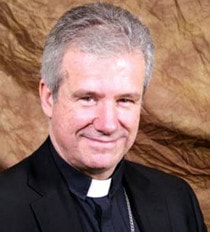 “Today, we would like to honour Maisonneuve and Jeanne-Mance, Montreal’s co-founders, to commemorate our French and Catholic roots, to recognize the legacy of values that imbue our society, to celebrate our very existence, and to give thanks to God.
“Today, we would like to honour Maisonneuve and Jeanne-Mance, Montreal’s co-founders, to commemorate our French and Catholic roots, to recognize the legacy of values that imbue our society, to celebrate our very existence, and to give thanks to God.
“This is a noteworthy celebration for the City of Montreal, the Island of Montreal, Greater Montreal, Quebec and Canada. Ville-Marie was founded on the Island of Montreal, and later adopted the same name. (...) On this day, May 17, as we celebrate the 375th Anniversary of the founding of Montreal, we once again look to the men and women who crossed the Atlantic without ever knowing for certain if they would safely arrive on the shores of the Saint Lawrence. These pioneers founded Ville-Marie without any certitude that they would survive the elements, the winter cold, or the wars. What was experienced at the time of the city’s founding has been courageously lived throughout Montreal’s history. This story continues to unfold today with the arrival of immigrants and refugees.
“The founding pioneers set out without knowing what the future would hold. Why? Because they had faith. Faith that God had called them, faith in the beautiful plan for a city founded on spirituality, community-living and solidarity. Their faith in Jesus Christ, crucified and risen, opened their hearts to the sure knowledge of God’s love and led them to rely on him by placing their entire lives in his hands. Their faith that Jesus, the Living Christ, is there beside us throughout every storm, gave them the confidence to proceed with hope and to base their lives on love and on the development of a city that radiates goodness, truth and beauty.
Our founding values remain unchanged
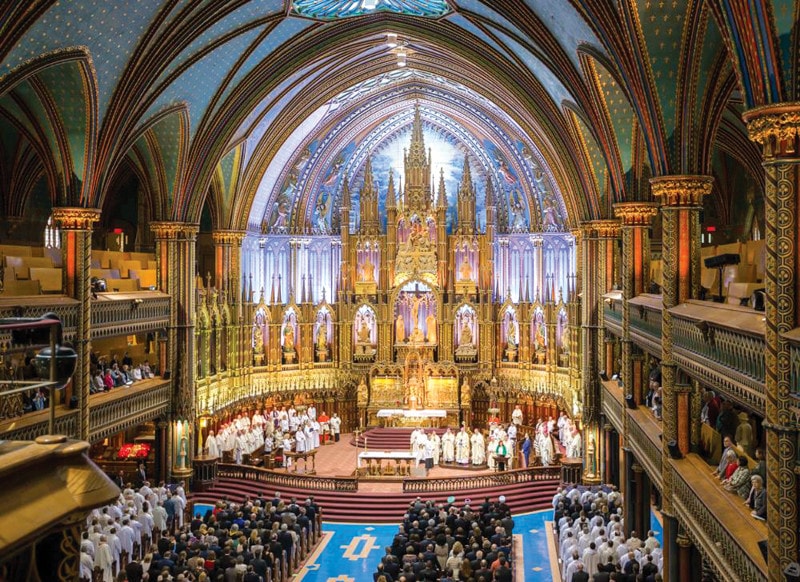
“Since the founding of Montreal, countless generations for various reasons, from diverse cultures and different beliefs, have set out to establish themselves here. The foundational values have stood the test of time and are still operative today. They have the ability to bring people together and to create peace.
“Spirituality is a call to believe that all human beings are created by God in God’s image, that each and every one is made for eternity, that all humankind, from every place and time, is called to enter into a covenant with God, that we all share the same humanity, the same fundamental dignity. Spirituality focuses one’s attention on God and, at the same time, on humanity, making a connection with God and, at the same time, connecting all of us to each other before God and under his loving gaze. Maisonneuve, Jeanne Mance, and all those who contributed to the planning and achievement of founding Montreal, were Catholics whose focus on God broadened their view towards others, regardless of belief.
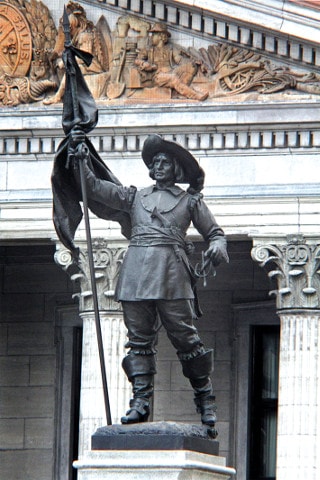 Statue of Paul Chomedey de Maisonneuve, made by Canadian sculptor Louis Philippe Hebert. It is part of a monument raised in 1895 in front of the Notre Dame Basilica. Statue of Paul Chomedey de Maisonneuve, made by Canadian sculptor Louis Philippe Hebert. It is part of a monument raised in 1895 in front of the Notre Dame Basilica. |
“This is why, from the beginning, Montreal was conceived as a model of community-living/vivre-ensemble. It was the desire to establish a city where the French pioneers and members of the First Nations would live together. There was intermittent warfare, but at the same time, the French learned from the Aboriginal Peoples how to live in this country. Injuries and losses were suffered, but at the same time, all were welcomed by the Religious Hospitallers of Saint Joseph at the Hôtel Dieu Hospital. The schools founded by Marguerite Bourgeoys and the Congrégation de Notre-Dame were open to all children and youth, and the priests of Saint-Sulpice were at the service of everyone. There were misunderstandings and confrontations, but there was also the Great Peace of Montreal in 1701. (...)
“The search for spirituality and community-living is also a search for solidarity. Everyone searches for meaning in life, needs human relationships and strives for peace. At times, it is said, and with good reason, that ‘the greatness of a civilization is measured by the place it gives to its weakest members.’ Montreal’s history is one of solidarity with those most in need, with those who have been struck by tragedy. From the religious communities of yesterday and today, to the community organizations of our times, the compassion and support that are given, without regard to cultural differences, are also a part of who we are, on a civil and political level.
A culture of peace
“In the name of Jesus, Maisonneuve and Jeanne-Mance, the founders of Montreal, embraced values that were both profoundly Christian and profoundly human. These same values are timeless, because they are fundamental to who we are as human beings. Together, let us continue to focus on spirituality, community-living/‘vivre-ensemble’ and solidarity, so that Montreal may remain a place where the dignity of every human being is upheld. Together, let’s build a society where individuals find fulfillment, where families flourish, and where the various segments of society experience respect, dialogue and peace.
“Let’s be inspired by these men and women, our ancestors, who, kneeling before God, allowed themselves to be guided by the Holy Spirit, in the joy of faith in the crucified and risen Jesus Christ. Let us look to the cross, source of reconciliation. In our personal, family, social and church lives, there are sunny days and dark, stormy ones. Let us thank God for his presence, and have faith that he will never abandon us.” (End of Archbishop Lepine’s homily.)
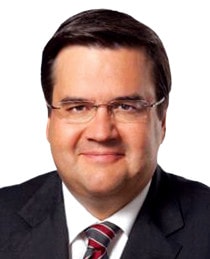 We cannot understand Montreal and its foundation without knowing its clearly spiritual origins. The mayor of Montreal, Denis Coderre, acknowledged it during the allocution he gave at Notre-Dame Basilica, on May 17, 2017:
We cannot understand Montreal and its foundation without knowing its clearly spiritual origins. The mayor of Montreal, Denis Coderre, acknowledged it during the allocution he gave at Notre-Dame Basilica, on May 17, 2017:
“Montreal was neither built in the turmoil of wars nor in the blood of revolution; Montreal was neither born of conquest nor in the quest for wealth and for gold. Montreal was born of a dream: that of carrying God’s word to the inhabitants all over the New World. Paul Chomedey de Maisonneuve, Jeanne Mance, and some 40 settlers and clergy who founded the village of Ville-Marie on the 17th of May 1642, did not dream of glory and fortune: their only ambition was to build a mission city that was to be the starting point of a peace-bearing mission of evangelization. This New World was, in the Europeans’ mind, a territory inhabited by peoples for many thousands of years, from whom the first settlers, including Paul Chomedey de Maisonneuve and Jeanne Mance, learned much and were inspired from. The First Nations took part and continue to take part in building the society in which we live.
“This morning we recall the first Mass that was celebrated at Ville-Marie by Jesuit Father Barthelemiew Vimont: a founding moment, a symbolic act. We are continuing a 100 year tradition that goes back to the 275th Anniversary of Montreal… A tradition that reminds us who we are and where we come from, that Montreal was built first and foremost on the values of the Catholic Church. This heritage, we assume totally. It is still very present today, inside this beautiful Basilica. It is present in the cross atop Mount Royal, in the grandiose Saint Joseph Oratory, a monument built by the faith of a whole people. It is present in all of the churches scattered throughout the city, whose bells were rung a few minutes ago, reminding us that Montreal is the “City of a thousand steeples”. A heritage that is found also in our religious communities, present in Montreal since the early beginnings of the colony, who have litterally built and administered the hospitals of Quebec for 300 years.
“In short, it is this whole spiritual dimension at the origin of the creation of our City that we celebrate this morning, for it is on solid ground that Montreal has evolved into an open and diverse metropolis…On this day of our 375th birthday, let us pay hommage not only to the courageous founders of Ville-Marie, but also to the men and women who have, throughout the years that followed, contributed to making of Montreal what it now is…
“During the first Mass of Montreal’s foundation, Father Barthelemew Vimont gave the faithful a prophetic sermon from which I quote: ‘What you now see is a seed of mustard, but it is cast by such pious hands and is animated by such a spirit of faith and religion, that no doubt Heaven must have great plans since It calls on such worthy workers. And I have no doubt that this small seed will produce a great tree that will someday do marvelous things, multiplying and spreading in all directions.’ I wish us many marvelous years to come.” (End of Mr. Coderre’s speech.)
In the name of Jesus
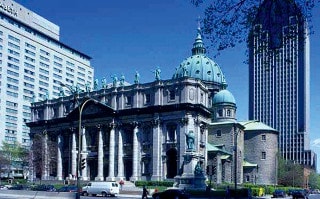 Montreal’s cathedral, dedicated to Mary, Queen of the World, was built on the model of St. Peter’s Basilica in Rome, to show the attachment of Montrealers to the Pope and Roman Catholicism. Montreal’s cathedral, dedicated to Mary, Queen of the World, was built on the model of St. Peter’s Basilica in Rome, to show the attachment of Montrealers to the Pope and Roman Catholicism. |
The foundation of Montreal was made primarily in the name of Jesus. This is what Archbishop Lépine explained in a pastoral letter he wrote for the 375th Anniversary of the foundation of Montreal, dated December 8, 2016:
“It was in the Name of Jesus that men and women set out to found the city of Montreal on May 17, 1642. The actual vision that led to the founding was motivated by the profound desire to proclaim Jesus Christ and to offer a model of community life and of educational and health-care services.
This God-inspired undertaking began in 1635 with Jérôme Le Royer, a man of faith, a husband and a father. Driven by a desire to evangelize, he founded the Société Notre-Dame to support the establishment of a Catholic community on the Island of Montreal. At the same time, this community would serve as a missionary centre, bringing together the French settlers and First Nations people in an atmosphere of respect and mutual enrichment. On May 17, 1642, Paul de Chomedey, Sieur de Maisonneuve, and Jeanne Mance, now Venerable, two lay people brimming with faith and missionary zeal, arrived on the island and founded Ville-Marie in honour of the Virgin Mary. Mass was celebrated upon their arrival, thereby affirming the spiritual dimension of this new settlement.
“We can believe, without a doubt, that the founding of our city was the result of a great mystical force that sustained these young people’s devotion to prayer, trust in the presence of God, and strength of courage. We focus on this heroic past to give thanks to the Lord, not only for the city’s beginnings but for its entire history up to now. In fact, over the years, several religious communities of men and women bore witness to God’s eternally gracious love.
And a faith-filled people arose.
“Many people, members of these various religious communities, were wonderful models of Christ’s charity toward the littlest, the poorest and the most vulnerable. Men and women of prayer dedicated their lives to serve the Gospel and their brothers and sisters. Among these witnesses to the faith, we recognize, as does the entire Church, the sanctity of the founders whose heroism and virtues challenge us today, who have left us an eloquent legacy of our Christian and social history, and to whom we can pray.
“Parishes were established with the help of men and women of various vocations who devoted their lives to forming and building parish communities centered on Jesus, so that they serve as houses of prayer, schools of faith, a supportive family, a means of proclaiming God’s closeness and of being of service to those most in need. (…)
“It is a fitting time to recall our origins and to reconnect with the missionary, spiritual, community and social momentum that motivated these men and women. These pioneers, who left everything behind in the Name of Jesus, are an example for us and for our local Church. They call us to revive our faith in Jesus and to build welcoming communities where we treasure living together in harmony…This anniversary presents a unique opportunity to highlight the spiritual dimension of our city’s origins and its history, the desire to live together that has been present since the beginning, and our rich tradition of solidarity with the poor and the sick.”
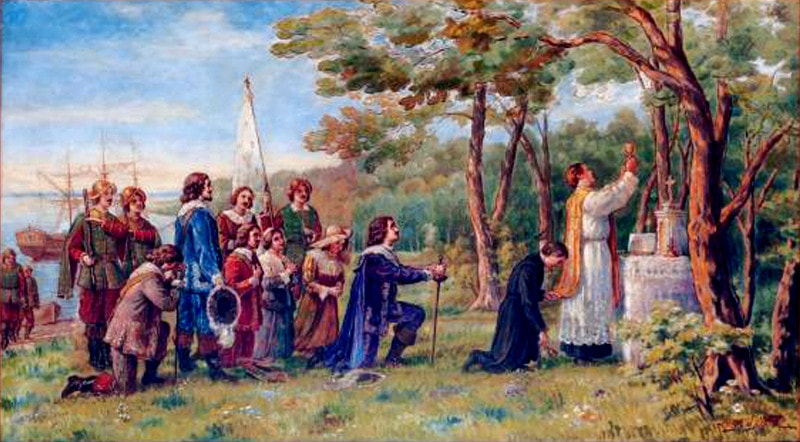 First Mass celebrated in Montreal on May 17, 1642 by Fr. Barthelemy Vimont, S.J. First Mass celebrated in Montreal on May 17, 1642 by Fr. Barthelemy Vimont, S.J. |